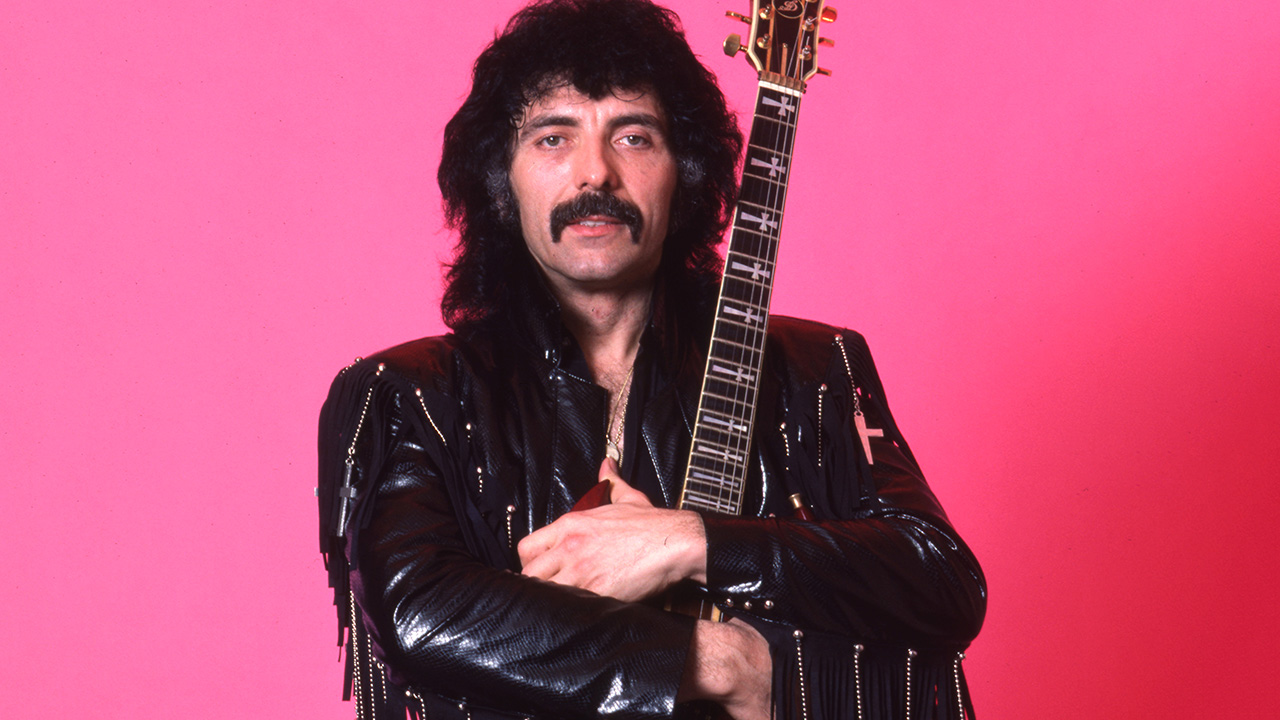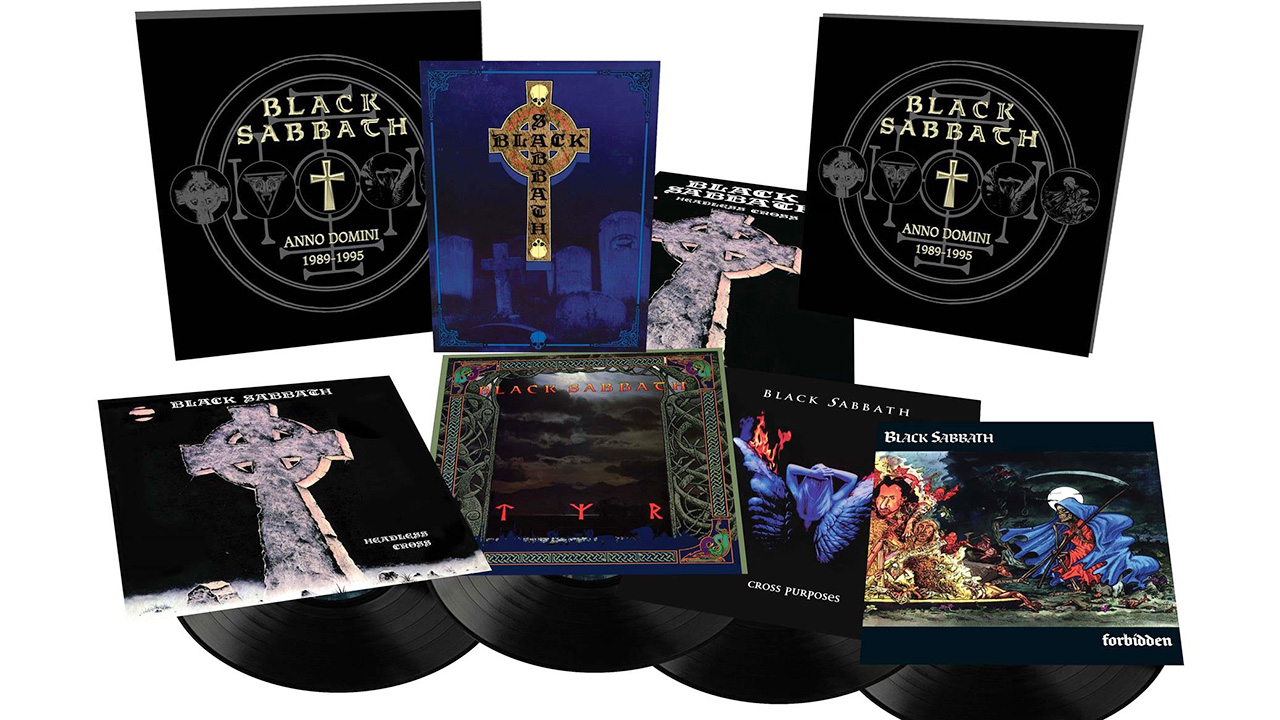
In 2024, after triumphant post-1997 reunions with both Ozzy Osbourne and Ronnie James Dio, Black Sabbath’s cultural significance is such that their home city of Birmingham has honoured the band with the Black Sabbath Bridge – fashioned from appropriately heavy metal. This present-day appreciation stands in stark contrast to the band’s perilous position in the mid to late ‘80s.
The band’s new Anno Domini 1989-1995 box set exhumes four long-deleted albums in remastered form, recorded during a period characterised by Tony Iommi in his Iron Man autobiography as a “lost era” which was overshadowed by the Ozzy and Dio formations.
“There’s the Ozzy thing and the Ronnie thing, and then there’s this. It’s like these albums belong to a lost era,” he wrote. “I am even struggling to remember stuff from that time because in a way it’s wiped from my mind.”
Nevertheless, those of us who stuck with the band recall how Iommi steered a reconfigured Sabbath to a lesser-known renaissance with Headless Cross (1989) and Tyr (1990).
He did so in the wake of a disastrous chain of rapidly fluctuating line-ups, precipitated in 1986 when then-label Warner Brothers forced him to release solo album Seventh Star under the Sabbath name – leaving the band’s reputation in tatters after The Eternal Idol (1987).
As a 13-year-old metalhead in 1985, I’d been too young to witness Sabbath’s classic line-ups. But their reputation loomed over my beloved loud and hairy genre, prompting a tentative punt on Black Sabbath’s Greatest Hits.
As a novice guitarist, it was Iommi’s unique ability to craft monolithic riffs and fret-melting solos that immediately hooked me. Some fans refused to entertain anything other than the classic line-ups – but I stayed the course due to the fact that, unlike some of his ‘70s peers, Iommi wasn’t coasting on his reputation.
Instead he came out fighting – not only as a bandleader, but also as a lead guitarist and songwriter. As a result, the albums gathered in Anno Domini showcase some of his most vicious riff along with searing solos full of fluid phrasing, blazing bursts of speed and fiery attack.
Iommi’s beguiling way with a riff was always central to Sabbath’s sound, and this period is no exception. When Death Calls (from Headless Cross) erupts from clean arpeggios into a pulverising riff that blends vintage Sabbath doom with Dio-era melodicism. Psychophobia (from Cross Purposes) reboots the prog-tinged feel of Sabbath Bloody Sabbath, melding deft tempo twists with brute force.
Similarly, Iommi’s solos frequently scythe dramatically through the songs – Heaven In Black (from Tyr) features ferocious, wah-drenched note flurries and a head-turning ascending chromatic climax; while on the Headless Cross title track, he flips dynamically between emotive, bluesy bends and warp-speed runs.
The Headless Cross album came the year after Sabbath had been counted out in 1988. It’s the strongest record to bear the band name since the Dio era.
Recorded by a new lineup featuring Eternal Idol vocalist Tony Martin, premier-league drummer Cozy Powell and long-time keyboard player Geoff Nicholls, it scored them their first top 30 placing since 1983. It belongs in any list of essential Sabbath albums.
Tyr’s potential was blunted by weak production – but that’s remedied with a forceful Iommi remix
With the addition of Powell’s former Whitesnake bandmate, bassist Neil Murray, for Tyr – another top 30 hit in 1990 – Sabbath’s resurgence continued. Impressive on record, the combination of Martin’s soaring range and power, over the concussive chemistry between Iommi, Powell and Murray, was all the more thunderous onstage, as I witnessed at Manchester Apollo that September.
Despite their success across Europe, their label IRS lacked US clout. A lucrative offer from Warner Brothers led to a short-lived reunion of the Dio line-up for Dehumanizer (1992, not included in the new box set), torpedoed by Dio’s refusal to join his bandmates for the final dates of Ozzy’s first farewell tour.

Iommi persevered, releasing two more creditable albums: 1994’s Cross Purposes, with fellow founder Geezer Butler and a returning Martin; then 1995’s Forbidden, with the reunited Tyr formation. The latter record’s potential was blunted by weak production – but that’s remedied with a forceful Iommi remix, enhancing the doomy, old-school Sabs charms of buried gems like Get A Grip.
Though there are more storied chapters of Sabbath history, Anno Domini puts an impressive, overlooked body of work from Iommi back in circulation, showcasing his striking development as a soloist and songwriter in the company of a stellar cast of collaborators. Guitarists seeking pointers on how to mature while still melting faces are urged to investigate.
- Anno Domini is out now in 4 LP vinyl and 4CD editions, with a super-deluxe vinyl version to follow on May 31.







